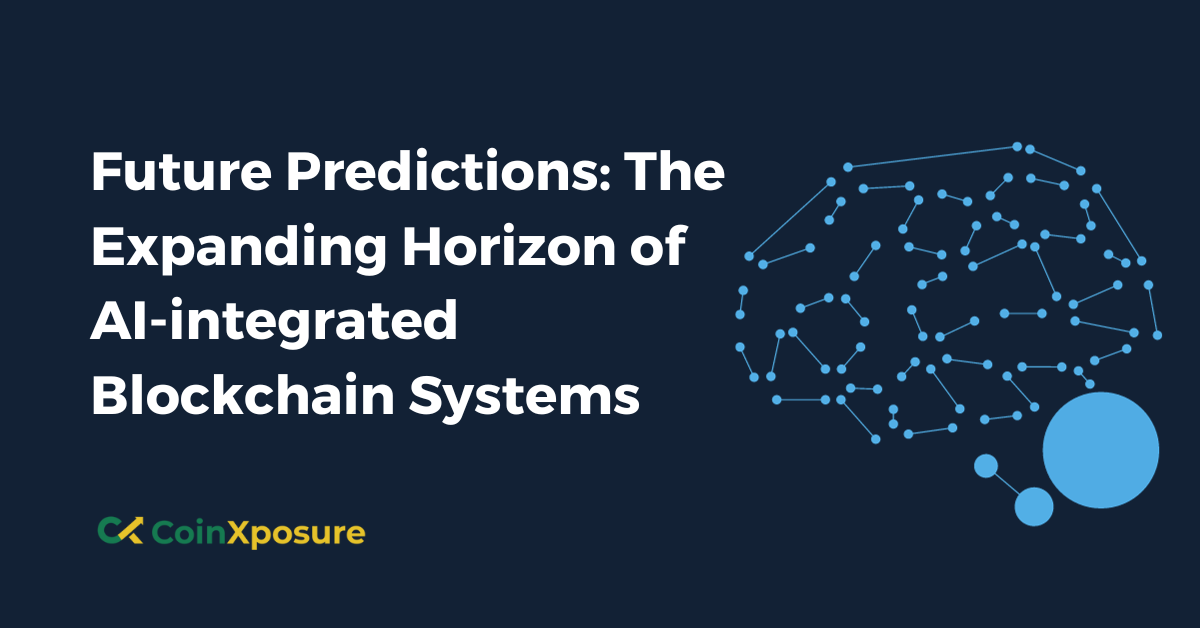
Future Predictions – The Expanding Horizon of AI-integrated Blockchain Systems
In the dynamic intersection of artificial intelligence (AI) and blockchain technology, a compelling narrative is unfolding, poised to redefine the very fabric of our digital landscape. The amalgamation of AI and blockchain systems presents a frontier of possibilities that extend far beyond their current applications.
As we stand at the precipice of technological evolution, this exploration delves into the future predictions of AI-integrated blockchain systems, envisioning a landscape where decentralized ledgers are not just immutable repositories but dynamic ecosystems driven by intelligent algorithms.
This journey promises to reshape industries, revolutionize governance structures, and imbue decentralized networks with unprecedented capabilities.
In this exploration, we delve into the expanding horizon of AI-integrated blockchain systems, anticipating a paradigm shift that transcends the limitations of current technologies and propels us into an era where the synergy of artificial intelligence and blockchain unlocks new potentials for innovation and transformation.
Current State of AI and Blockchain
Significant developments and ongoing integration efforts marked the state of AI and blockchain:
- AI Integration in Blockchain
- Consensus Mechanisms
- Predictive Analytics
- Privacy and Security
- Cross-Industry Integration
AI Integration in Blockchain
- Smart Contracts: Smart contracts, self-executing contracts with the terms of the agreement directly written into code, were becoming more sophisticated. AI was being explored to enhance the capabilities of smart contracts, enabling dynamic adjustments and more complex decision-making processes.
- Decentralized Autonomous Organizations (DAOs): The concept of DAOs, organizations run by code rather than people, was gaining traction. AI was being considered for decision-making processes within DAOs, potentially leading to more efficient and adaptive governance structures.
Consensus Mechanisms
- Scalability Solutions: Blockchain networks were grappling with scalability issues. AI-driven consensus mechanisms were explored to enhance scalability, allowing for more transactions per second and improved network performance.
- Adaptive Consensus: The idea of consensus algorithms adapting to changing network conditions through AI algorithms was being researched. This could lead to more robust and flexible blockchain networks.
Predictive Analytics
- Market Insights: Some blockchain projects were integrating AI for predictive analytics. This involved using machine learning algorithms to analyze market trends, predict asset prices, and provide valuable insights for decision-making.
Privacy and Security
- Privacy Solutions: Privacy was a concern, especially in public blockchains. AI was employed to develop enhanced privacy solutions, including advanced encryption and anonymization techniques.
- Security Measures: AI was utilized to bolster security measures on blockchains. This included using machine learning algorithms to detect and prevent fraudulent activities and cyber threats.
Cross-Industry Integration
- Diverse Applications: AI-integrated blockchain applications were expanding beyond finance. Industries such as healthcare, supply chain, and logistics were exploring the potential of these technologies for improving efficiency, transparency, and security.
As technology rapidly evolves, checking for the latest developments is recommended to gain a more accurate picture of the current state of AI and blockchain integration.
The Synergy Between AI and Blockchain
The synergy between AI (Artificial Intelligence) and blockchain technology holds the potential to create a powerful and transformative impact on various industries.
Combining these two technologies can address each other’s limitations and enhance their capabilities, leading to a more efficient, secure, and intelligent ecosystem. Here are key aspects of the synergy between AI and blockchain:
- Data Security and Transparency
- Enhanced Decision-Making with Smart Contracts
- Decentralized Autonomous Organizations (DAOs)
- Consensus Mechanisms and Scalability
- Predictive Analytics and Insights
Data Security and Transparency
- Blockchain’s Contribution: Its decentralized and immutable ledger provides a secure and transparent environment for data storage. Transactions on a blockchain are recorded in a tamper-resistant manner.
- AI’s Contribution: AI algorithms can enhance data security by identifying threats and vulnerabilities. Additionally, machine learning can be used to analyze patterns and anomalies in data, detecting fraudulent activities.
Enhanced Decision-Making with Smart Contracts
- Blockchain’s Contribution: Smart contracts on the blockchain automate and enforce the terms of agreements, reducing the need for intermediaries. They provide a transparent and trustless way to execute and verify transactions.
- AI’s Contribution: Integrating AI into smart contracts allows more dynamic and intelligent decision-making. AI algorithms can analyze real-time data and adjust contract terms based on changing conditions, making contracts more adaptive and responsive.
Decentralized Autonomous Organizations (DAOs)
- Blockchain’s Contribution: DAOs, powered by blockchain, enable decentralized decision-making and governance. Participants have voting rights proportional to their stake in the organization, creating a transparent and democratic structure.
- AI’s Contribution: AI can be integrated into DAOs to automate decision processes. Machine learning algorithms can analyze data and make predictions, providing valuable insights for DAO participants when making governance decisions.
Consensus Mechanisms and Scalability
- Blockchain’s Contribution: Blockchain networks rely on consensus mechanisms to validate and agree on transactions. However, achieving consensus at scale can be challenging.
- AI’s Contribution: AI can optimize consensus mechanisms, making them more adaptive and efficient. Machine learning algorithms can analyze network conditions and adjust consensus protocols, addressing scalability issues and improving overall network performance.
Predictive Analytics and Insights
- Blockchain’s Contribution: Blockchain provides a decentralized and transparent ledger of transactions. This data can be utilized for analytics and auditing purposes, fostering accountability.
- AI’s Contribution: AI algorithms can analyze blockchain data to extract meaningful insights and predict trends. This combination enables more informed decision-making in various industries, such as finance and supply chain management.
The synergy between AI and blockchain is a dynamic and evolving field, with ongoing research and development to unlock new possibilities for innovation across diverse industries. As these technologies continue to mature and integrate seamlessly, their combined impact is expected to reshape the future of digital ecosystems.
Predictions for the Future AI and Blockchain
Here are predictions of the future:
- Evolution of Smart Contracts
- Decentralized Autonomous Organizations (DAOs)
- AI-Enhanced Consensus Mechanisms
- Predictive Analytics and Market Insights
- Privacy and Security Advances
- Cross-Industry Integration
Evolution of Smart Contracts
Smart contracts will evolve to become more sophisticated and adaptive. AI integration will enable self-executing contracts that dynamically adjust terms based on real-time data and changing conditions, enhancing contract automation.
Decentralized Autonomous Organizations (DAOs)
DAOs will see widespread adoption, with AI pivotal in decision-making processes. AI-driven algorithms will facilitate more efficient and informed governance within decentralized organizations.
AI-Enhanced Consensus Mechanisms
Consensus mechanisms on blockchains will become more scalable and adaptive through AI integration. Machine learning algorithms will optimize consensus protocols, addressing scalability challenges and improving overall network performance.
Predictive Analytics and Market Insights
The integration of AI into blockchain systems will lead to advanced predictive analytics. AI algorithms will analyze blockchain data for more accurate market insights, aiding investment decisions and strategic planning.
Privacy and Security Advances
AI-driven privacy solutions will enhance data security on blockchains. Advanced encryption, anonymization techniques, and machine learning-based threat detection will fortify the security measures of blockchain networks.
Cross-Industry Integration
AI-integrated blockchain applications will extend beyond finance, infiltrating healthcare, supply chain, and other industries. Collaborative ecosystems will emerge, leveraging the combined strengths of AI and blockchain for enhanced efficiency and transparency.
These predictions envision a future where integrating AI and blockchain systems transcends current limitations, opening new avenues for innovation, efficiency, and collaboration across diverse sectors.
As these technologies mature, their combined impact is poised to reshape the digital landscape and redefine how we interact with decentralized and intelligent systems.
Challenges and Ethical Considerations of AI and Blockchain
Here are the challenges and ethical considerations of AI and blockchain:
- Interoperability Challenges
- Regulatory Uncertainty
- Data Privacy Concerns
- Security Risks
- Ethical Use of AI
- Decentralized Governance Challenges
Interoperability Challenges
Ensuring seamless interoperability between AI and blockchain systems remains a significant hurdle. Standardization efforts are necessary to facilitate effective communication and integration between diverse technologies.
Regulatory Uncertainty
The evolving nature of AI and blockchain technologies poses challenges for regulatory frameworks. Governments and regulatory bodies face adapting existing regulations or creating new ones to address the unique aspects of AI-integrated blockchain systems.
Data Privacy Concerns
While blockchain ensures transparency, privacy concerns persist, especially in public blockchains. Balancing the need for transparency with individuals’ privacy rights is a complex ethical consideration that requires innovative solutions.
Security Risks
As AI-integrated blockchain systems become more prevalent, the risk of new attack vectors and security vulnerabilities increases. Developing robust security measures and staying ahead of emerging threats is crucial to maintaining the integrity of these systems.
Ethical Use of AI
The ethical use of AI, particularly in decision-making processes within blockchain systems, is a concern. Ensuring fairness, transparency, and accountability in AI algorithms is essential to prevent unintended consequences or biases.
Decentralized Governance Challenges
DAOs and other decentralized governance structures may face challenges in maintaining fairness and preventing manipulation. Striking a balance between decentralization and effective governance is crucial for the success of these systems.
Navigating these challenges and ethical considerations is crucial for the responsible development and widespread adoption of AI-integrated blockchain systems. Collaboration between technology developers, regulators, and ethicists is essential to address these issues and foster a sustainable and ethical digital future.
Conclusion
Integrating artificial intelligence (AI) with blockchain technology represents a frontier of innovation with transformative potential. The future landscape promises advanced smart contracts, decentralized autonomous organizations (DAOs) empowered by AI, and more efficient consensus mechanisms.
Predictive analytics, cross-industry integration, and enhanced privacy measures are poised to reshape how we interact with decentralized systems.
However, this journey is not without its challenges and ethical considerations. Interoperability struggles, regulatory uncertainties, and the ethical use of AI in decision-making processes demand thoughtful solutions. Privacy concerns, security risks, and the need for sustainable energy practices underscore the importance of responsible development and governance.
As we progress, collaborative efforts between technology developers, regulatory bodies, and the public will be instrumental in overcoming these challenges. Striking a balance between innovation and ethical considerations is imperative for ensuring AI-integrated blockchain systems’ long-term success and societal benefit.
In this dynamic landscape, where the expanding horizon of possibilities meets the challenges of responsible implementation, the fusion of AI and blockchain is a testament to technology’s continuous evolution.
The journey ahead holds the potential to redefine industries, governance structures, and our digital interactions, ushering in an era where the intelligent integration of these technologies fosters a more transparent, efficient, and equitable digital future.





